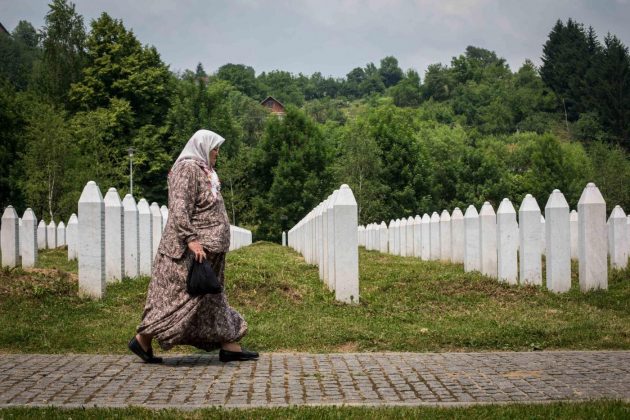Srebrenica – a photo
All is quiet. You walk in between these long, narrow rows of white tombstones, and you don’t see anything else, you don’t hear anything else, it seems that that’s all what’s left, on earth: it seems that everybody is dead. And actually they are. The Srebrenica Memorial reminds of Arlington, reminds of the American war cemeteries, it is a plain, bare memorial: only white tombstones. At the entrance yet, the victims are listed in alphabetical order, and every name appears not just two, three times, three cousins, two siblings, a father and son: it’s repeated fifteen, twenty, thirty times. It looks like a phone book. Like a civil registry – it somehow is a civil registry. Men in Srebrenica were killed one by one. Systematically. Methodically.
The women here, the men there.
And no one will be left alive.
It was 1995. The war in Bosnia had been raging for three years, and Srebrenica, a small town of thermal springs where many refugees had found shelter, had been declared safe area by the UN. With the excuse of delivering aid, Serb forces under the command of Ratko Mladić went in, and in about a week, in July, murdered 8,373 men. The blue helmets stood by.
They’ve been later awarded a medal of honor.
Twenty one years on, Srebrenica is an empty road that goes mute through a valley dotted of little houses. A teenager plays basketball by himself on an asphalt court, against a rusty backboard, a man nearby smokes a cigarette on a step, head down. It’s raining. There is no one. Only a country store, round the corner, that sells a bit of everything. Houses have the sloping roof, a wood fence, a kitchen garden: then you realise they have been uninhabited since a long time. On the walkway, a faded tricycle. A woman stares at me. An old woman who looks like an old woman in Syria, a while ago, she was living underground, in the countryside, in a Roman tomb, she had the same knit shawl, and these same wrinkles, like a trunk of olive tree, she was standing in the same way, she was staring at me in the same way – how did it read? Carlo Levi, with these black eyes that don’t shine, and seem not to look, like empty windows in a dark room.
Yes, I know I should knock on some doors now, and talk. Ask questions. That’s why I am here. But what should I say? Yes, ma’am, we already met. Yes. You remember? It was winter, and you made me tea, it was cold, so cold, and everybody was dead.
What could I ever ask?
Is there anything I yet don’t know? About this war, about any war.
I walk in between these white tombstones, these long, narrow rows, under this iron sky, and I think in twenty one years, when I will be walking in the Aleppo Memorial. And it will all be tidy, finally, it will all be clear: all what now looks mixed up, and blind, impulsive, action and reaction – and instead it will all be clear: systematic: thought and aforethought. All on purpose. Those who did, and those who did not, who stood by – in twenty one years, when those black eyes will be mine. Those homes, my home.
Today Mladić is on trial at The Hague. Radislav Krstić, the general who led the assault, has been sentenced to 35 years, Radovan Karadžić, head of the Serb Republic of Bosnia, has been eventually arrested, and last April, sentenced to 40 years. In Belgrade, he is still widely viewed as a hero, like Slobodan Milošević, the war’s mastermind, who was saved from prison only by death. I can nearly hear professor Antonio Cassese, first president of the Hague tribunal for the former Yugoslavia, with whom I studied, I can nearly hear him as he says: I know, it’s not a lot, I know, but it’s better than nothing. International law is far from perfect, he says, it’s incomplete, it has countless flaws: but every judgement becomes a precedent, it lays the ground for the next judgement. For a better judgement. Even though it’s never enough.
He says: Law learns from itself. I can nearly see him, he says: It has countless flaws, yes. But that’s why you shouldn’t attack it, you should defend it. Defend it. Always.
Today Srebrenica has 15,000 people, and a Serb majority. The new mayor, Mladen Grujicic, says that there’s never been a genocide here.
Assad says that in Syria there’s never been a revolution.
Law perhaps learns, yes. But what about history?
